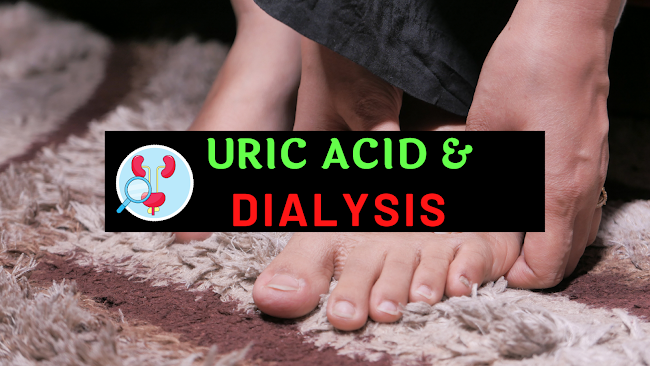Does dialysis remove uric acid? An analysis !
Does dialysis remove uric acid? This is a touchy subject, with many differing viewpoints. There is no definite cut-off point for diagnosing hyperuricemia in a patient. It is typically deemed dangerous when it exceeds a particular threshold and creates symptoms. A patient on dialysis should have periodic uric acid testing regardless of their uric acid level.
It is essential to get medical advice before deciding to undertake dialysis. Your doctor may talk to you about your symptoms and medical history, and perform blood tests and imaging tests to look for crystals. These tests can help you decide whether dialysis is the best treatment option for you. You will also be instructed on any required precautionary actions. Some therapies may even be able to reverse the disease while it is still in the early stages.
If you have gout symptoms, your doctor may prescribe a uric acid-lowering therapy. Increased uric acid levels have been linked to poor renal function in many studies. They also discovered that greater urate levels may damage kidney architecture and that increased uric acid concentrations can be a marker of renal illness.
Before starting dialysis, there are a few things to think about. You should first seek medical advice. Your symptoms and medical history should be mentioned. They'll arrange blood tests and imaging studies to look for uric acid levels that are too high. If your findings are normal, you may need further therapy. Your doctor will also give you advice on how to lower your uric acid level in your blood. Your medical history, drugs, and lifestyle will all play a role.
Hemodialysis patients with asymptomatic hyperuricemia were shown to be considerably more likely to have increased uric acid as a consequence of the investigation. This implies that asymptomatic hyperuricemia might indicate renal disease. If you have a bad diet and a low purine consumption, you're more likely to get a kidney problem caused by uric acid.
While dialysis has a lot of advantages, the possibility of developing hyperuricemia remains a worry for patients. In reality, hyperuricemia may be a side effect of hemodialysis. Because of the treatment's uneven influence on uric acid levels, this is the case. As a result, it's critical to keep an eye on your uric acid levels.
It's crucial to remember that a patient's condition should be taken into account before dialysis. This is due to the fact that people with renal illness may have uric acid levels that are greater than normal, indicating hyperuricemia. It is crucial to emphasise, however, that patients with high uric acid levels should visit a doctor to ensure that none of these concerns are occurring.
Weiner et al. found that a higher uric acid level in a patient with renal failure is a marker of a kidney disease in a recent research. The patients were matched based on their gender and age. The patient's findings were positive. Patients' functional status improved as a result of the new medicine. It's important to remember that dialysis includes both hazards and advantages.
A study of hemodialysis patients found that extremely low uric acid levels increase the risk of acute renal damage. Between individuals with extremely low SUA levels and those with greater levels, a J-shaped curve was found. In addition, extremely high uric acid levels were linked to more hospitalizations and the need for mechanical ventilation. These individuals were also examined for residual diuresis in addition to their uric acid levels.
Uric acid clearance did not seem to be affected by the size of the dialysis membrane. The size of the dialysis membrane was the only factor linked with hyperuricemia, despite the fact that other parameters impact uric acid clearance. Similarly, a lengthy time between dialysis treatments was linked to elevated uric acid levels. Although this research could not give conclusive proof, it did reveal that dialysis does eliminate uric acid from the body.




Comments
Post a Comment